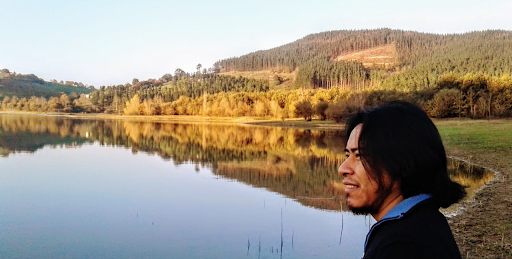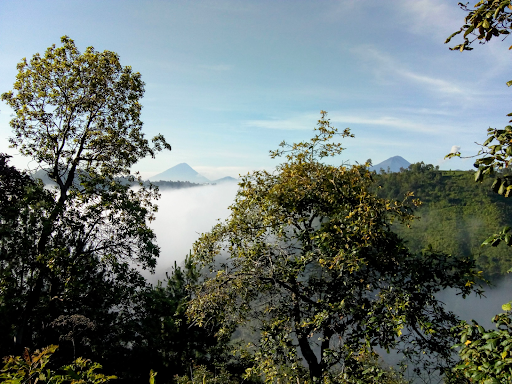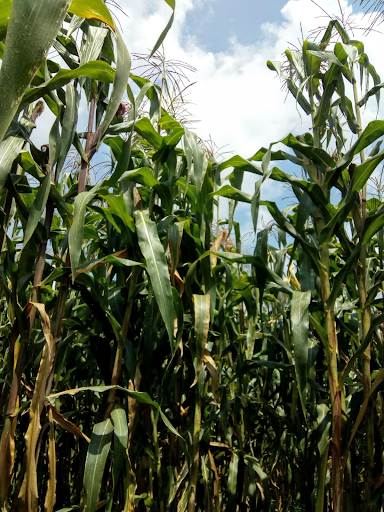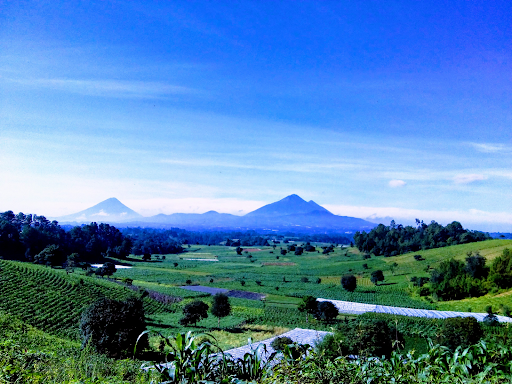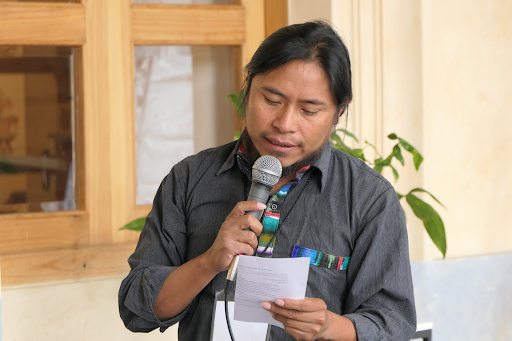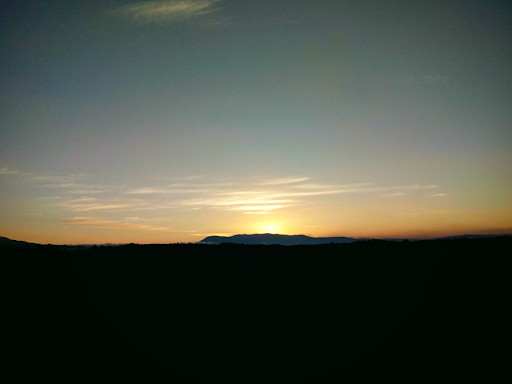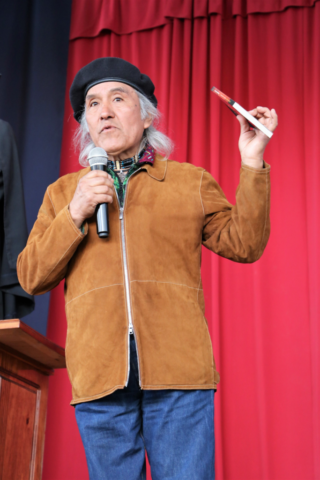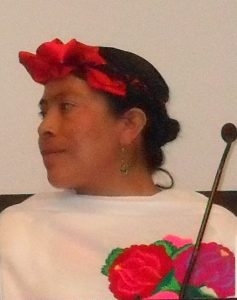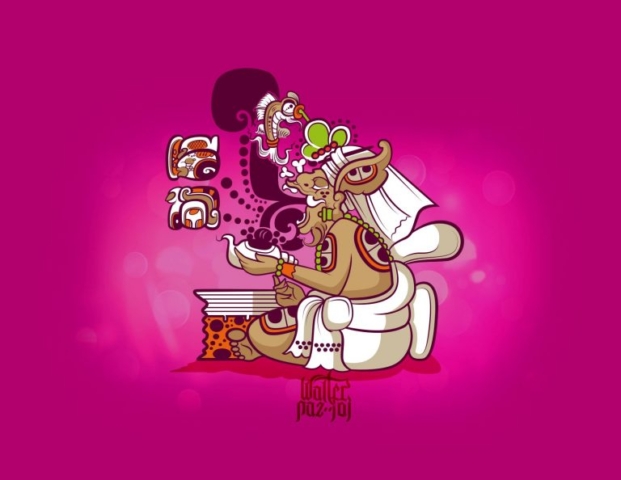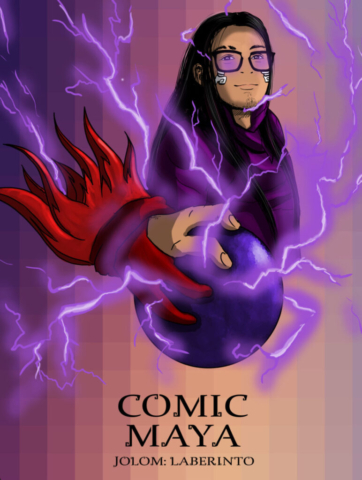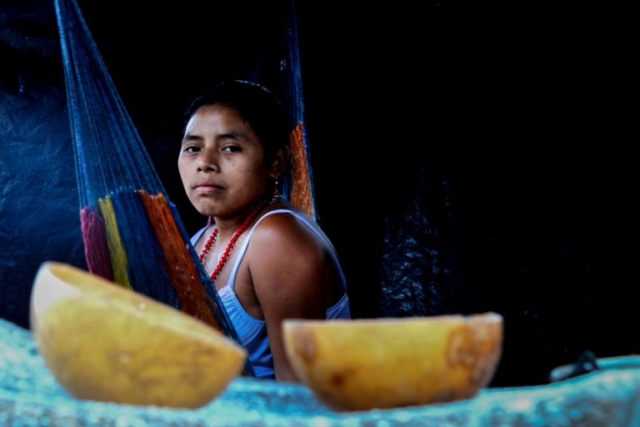Xti Saquirisan Na Pe / Planicie de olvido / Plains of Forgetfulness © Miguel Ángel Oxlaj Cúmez. Cholsamaj, 2020
Translations from Spanish © Paul Worley and Juan G. Sánchez M
Miguel Angel Oxlaj Cúmez is Maya kaqchikel, from Chi Xot (Comalapa, Guatemala). He holds a degree in Mass Media Communications from the University of San Carlos Guatemala, and a Specialization in Linguistic Revitalization from the Mondragon University of the Basque Country, Spain. He is a professor at the Maya Kaqchikel University –Chi Xot campus–, a union leader, and a social/digital activist for Indigenous languages. He is one of the organizers of the Virtual Latin American Festival of Indigenous Languages. Miguel is a representative for the Mayan, Garífuna and Xinka peoples (UMAX) before the University Reform Commission -CRU- of the University of San Carlos Guatemala, as well as a representative for the Fight against Racism, Xenophobia and other Forms of Discrimination Movement, of the Public Services International Organization -ISP- for Mexico, Central America and the Dominican Republic. He is a member of the collectives: Kaqchikela’ taq tz’ib’anela’, and Ajtz’ib’. In 2009 he was awarded with the National Prize for Indigenous Literatures B’atz, Guatemala. He has published: La misión del Sarima’ (“The Sarima’s Mission”, narrative), Mitad mujer (“Half woman”, narrative), and Planicie de olvido (“Plains of Forgetfulness”, poetry.) His poems have been published in digital magazines and anthologies in both Kaqchikel and Spanish. He has written about one hundred stories for the Guatemalan Ministry of Education’s textbooks, which have been translated into Maya languages such as Q’eqchi ‘, Mam, K’iche’, Tzutujil, Q’anjobal, Achi, Ixil. He writes poetry and narrative, both in Spanish and Kaqchikel –his native language.
II
Rïn chuqa’ xinaläx kik’in ri kaminaqi’
xinaläx chuxe’ ri ruk’isib’äl q’aqajob’q’aq’ ri ruk’wa’n wi ri kamïk
ri q’aq’ nib’ojloj toq nkamisan ja wi ri’ ri uxlak’u’x
ri nima oyowal yeruxe’qeq’ej wi konojel ri rurayb’el ri qak’u’x
ri q’aq’ nkamisan ruk’ojon wi ri taq qachi’
xa xe wi ri kib’is ri xe uk’we’x
nuretz wi jub’a’ ri maq’ajan
rik’in ri ruk’isib’äl taq kich’ab’äl
rik’in ri ruk’isib’äl taq kitzij
rik’in ri ruk’isib’äl kitzij ri xkijosja’ kan
rik’in ri ruk’isib’el taq kib’ixab’änïk
rik’in ri ruchoq’omalil ri kisamaj kichapon
Rïn yenwak’axaj wi
ja ri’ wi ri lema’ ri yinkiwartisaj
[ronojel taq tokaq’a’]ja ri’ wi ri achik’ ri yennataj toq nsaqär pe
ja ri’ wi ri itzel taq achik’ ri yik’asb’an
[rik’in xib’iri’il]kik’in ri tzijonem ri’ xinwetamaj ri sik’inïk wuj
rik’in ri ronojel re’ xinwetamaj xinsik’ij ruwäch ri k’aslemal
rik’in ronojel re’ xinmestaj ri kikotem
Ja k’a ri’
toq ri e k’äs pa kik’u’x
majun wi yeq’ajan ta
juk’a’n wi yetzu’n apo
yetze’en wi rik’in janila b’isonem
nikijalwachij wi ki’
nkikusaj wi ri k’oj ri kikusan konojel
yeb’ixan wi chi re ri amaq’ ri ya’on chi kiwäch
chuqa’ yexuke’ wi chwäch ri ajaw ri man itzel ta tz’eton
Ja ri kojqan
xa xe wi ri yek’ase’
Ja ri toq xinch’akulaj ri kamisarem
ri kamisanel q’aq’ chuqa’ ri ajch’ayi’, rije’ ri’ xe’ok wetz’anel
ri kamïk xok nuchajinel
Wakami
jun peraj chi re ri nuwinaqil
k’a tal tajin nisk’in
ri jun chïk tanaj
nrajo’ ta nuyupij jun runaq’ ruwäch chi re rik’aslemal
pa runik’ajal re jun li’an re’ rulewal ri mestaxinïk
II
I graduated with the class of the dead
I was born under a hail of gunfire
rifles were peace
the war crushed our dreams
bullets sewed our mouths shut
and the silence was only broken by the cries
of the disappeared
by their fraying voices
their last words
their murmured goodbyes
their final advice
their reasons for fighting
I listened to them
they were my bedtime stories
[every night]they were dreams I remembered in the morning
the nightmares that awakened me
[screaming]the histories with which I learned to read
to understand life
to forget about happiness
Then
those who thought they were alive
kept silent
averted their gaze
smiled sadly
disguised themselves as normal
put on whatever mask was fashionable
sang the anthem to a country that had been imposed on them
and prayed to an authorized god
The only plan
was to survive
That’s how butchery naturalized me
how I played at bombs and soldiers
how death became my main babysitter
Today
part of me
keeps screaming
while the other
tries to wink knowingly at life
on the plains of forgetfulness
Pachäj, Comalapa, Chimaltenango (Iximulew/Guatemala) © Miguel Ángel Oxlaj Cúmez
VI
Man ajtz’ib chuqa man aj pach’un tzij ta
rik’in k’a jub’a’xa tzalq’omanel
ruma re samaj re’
man choj ta chi yanojin chuqa yatz’ukun
k’o ch’aqa b’ey nakamuluj ri xk’ulwachitaj yan
ja k’a ri yatzalq’omin jari’ ri b’ama jantape’
Naq’asaj pa jun chïk ch’ab’äl
ri ruju’il ruka’ ri ati’t toq njok’on
ri ruju’il ri rasaron ri mama’ toq nuchoy ri ruwach’ulew
ri mank’isel taq samaj pa akuchi’ tikil ri kape
ri janipe’ ralal ri juq’o’ wok’al juna’ ri e ejqan chi tapäl
ri ruq’axomal ri jantape’ yatiko’n po majun achike k’oltiko’n nak’ul
Man ajtz’ib chuqa man aj pach’un tzij ta
rik’in k’a jub’a’xa tzalq’omanel
naq’asaj pa jun chïk ch’ab’äl
ri kiq’axomal ri nimaläj taq che’ ri xechoyoyex
ri ruq’axomal ri raqän ya’ etzelan
ri ruk’ayewal ri ajxik’ ri majun rochöch ta
ri xtutzolij ri qate’ ruwach’ulew ruma ri ruq’axomal qamolon
Man ajtz’ib chuqa man aj pach’un tzij ta
rik’in k’a jub’a’xa tzalq’omanel
VI
Neither writer nor poet
maybe a translator
Because this work
isn’t just the act of imagining or creating
sometimes it’s recreating
but it is more translating
Translating to another language
the compass of my grandmother’s grinding stone
the rhythm of my grandfather’s hoe
the chores in the coffee grove
the weight of five centuries born on a mecapal *
the pain of sowing so much and reaping nothing
Neither writer nor poet
maybe a translator
carrying
the silent groan of the fallen tree
the funeral lament of the polluted river
the miseries of nestless birds
the immediate defensive reaction of our wounded mother
into another language
Neither writer nor poet
maybe a translator
* Mecapal: cord rested on the forehead, used to bear a load on the back
La milpa, la vida (“Cornfield, life”) © Miguel Ángel Oxlaj Cúmez
Ri wati’t ri nimalaxel
Ri q’ijul man xtikïr ta chi rij
xpapo’ chupam jun rub’olqo’t ri ruxoq’op
xsach ruk’u’x chuwäch ri ruwachib’äl ri rupo’t
xsach chupam ri rub’eyal ri jalajöj taqruyuchuj rutz’umal
Ri wati’t ri nimalaxel
Ri ruponib’äl
Xetal ruchapom rupub’axinïk ri pom
ruchapon runojsaxik ri kajulew
rik’in rujub’ulil
juq’o’ taq oq’ej
juq’o’ ruwäch b’ixanïk ri man e tz’eqet ta
rik’in k’a jun sutz’aj rayb’äl ri e oyob’en
Ri cera ri jalajöj kib’onilal
kichapon ruk’atïk ri kib’isonem chuwäch ri Tyox
nikisaqirisaj ri rokib’äl ri kamïk
nikisaqirisaj rupaläj ri meb’el ri xe tal k’o
ri man nib’e ta
kichapon rutijik ri tz’ilan rurayb’äl
re jun amaq’ re’
[ri man choj ta nk’oje’]Ri kaji’ jäl (saqijäl, q’anajäl, raxwach chuqa’ ri kaqajäl)
xetal e k’o chuwäch ri Tyox
tajin nkichajij ri ruq’ijul ri wa’ijal
richin manäq xketoqa ta chïk
richin manäq xkemestäx
richin xkexime’paki natab’äl ri winaqi’
ri xeti’ojir rik’in kisamaj ri qawinäq
Ruxara ri k’äy
ruk’u’x ri q’ijul
ruk’ulb’a’t ri q’axomal rik’in ri k’ayewal
akuchi’ [xa jub’a’ ma] xe tal nasäch awi’
(richin akosik, richin ab’ey, richin ab’is…)
ri xara ri’ xetal yakon chuxe ruch’atal ri Tyox
ruchapon ruch’amirsaxïk ri b’isonïk
yerukuxka’ ri
[jalajöj]taq animajinäq
[ri majun kitzolib’äl ta]Ja ri rij rupo’t
Loq’oläj sik’iwuj
akuchi’ xutz’ib’aj ri runa’ojil
akuchi’ xupab’a’wi ri ruch’ob’oj
akuchi’ xuyäk kan ri rumanq’ajanil
akuchi’ xerupach’uj ri rutzij
K’a xetal rewan ri ruk’u’x ri aq’ab’äl
tunun k’a paruwi’ ri ruch’atal ri Tyox
royob’en toq rija’ xtiyakatäj chik pe
richin ruq’ejelonik ri nimaq’a’
[bisbissbisssbis, bisbissbisssbis
bisbissbisssbis, bisbissbisssbis]
Rub’ixanik pa bisis
xetal nq’ajan kik’in ri q’eqal taq jäb’
nroq’ej toq ye’ik’o ri al
nxik’an k’a kik’in
nib’e, nanimäj
ruma man tikirel ta nib’an ri tiko’n
chi rij ruq’ab’aj
ma x ata chi rij ruxikin
Ri wati’t, ri nimalaxel
Ja ri’ toq xluke’ qa ri rij
ja ri’ toq xsach rutzub’al
ja ri’ toq chajir ruwi’aj
ja ri’toq xetzaq el ri reyaj
Ronojel ri’ man ja ta rurijixik xub’ij
man ja ta ri raq’ab’äl xutzijoj kan
Xa jari’ wi rusipanik xuya’chi re ri k’aslem
Jari’ ri ruwinaqil xutzolij
chwäch ri jalajöj kiwäch taq kamïkri xepe chi rij ri ruwinäq
Rusemetil ri ruq’ab’aj
ri pa’k xel pe chi rij ri ruxtuxil
ri chikopiwinäq ruch’ami’y
ri ruchajil rupo’t
man ja’ ta ri ruch’ojixinik ri meb’alil akuchi’ xya’ox wi
man ja’ ta chuqa’ ri retal ri ruq’axomal
Jari’ ri rija’tz ri xutik kan
ri rayb’äl xretaj ri chuwäch apo
Ri wati’t ri nimalaxel
Ri q’ijul man xtikïr ta chi rij
xpapo’ chupam jun b’olqo’t richin ri ruxoq’op
xsach ruk’u’x chuwäch ri ruwachib’äl ri rupo’t
xsach chupam ri rub’eyal ri jalajöj taq ruyuchuj rutz’umal
My grandmother the nimalaxel [1]
Time could not stand her
it stopped in the weaving of her xoq’op [2]
it was confused by the code of her huipil
it got lost in the labyrinths of her wrinkled skin
My grandmother, the nimalaxel…
Her incenser
continues erupting copal
saturating the universe
with the aroma
of a million laments
of a thousand shapeless songs
of a cloud of hopes
The colored candles
continue burning their silence before the Tyox [3]
lighting death’s arrival
illuminating misery’s persistence
consuming the illusion
[exiled]of a people
[rebelling]The four ears of corn (white, yellow, black, and red)
remain, intact, before the Tyox
watching over times of hunger
so they are not repeated
so they are not forgotten
so they remain tied
to the memories of men
who get fat with the sweat of our people
The jar of k’äy [4]
nectar of time
border between pain and misfortune
[almost] mandatory point of disconnection(richinakosik, richinab’ey, richinab’is…)
kept in reserve beneath the table of the Tiox
aging sorrows
dressing the
[consecutive]escapes
[without return]Her huipil, the rijpo’t,
sacred book
where she wrote her memories
where she engraved her thoughts
where she expressed her silence
where she gave shape to her verses
It continues encrypting the afternoon’s code
And folded on the Tyox’s table
It waits for her to wake up
for the morning ceremony
[hmmhmmmhmmmhmm, hmmhmmmhmmmhmm
hmmhmmmhmmmhmm, hmmhmmmhmmmhmm]
Her hummed song
still livening up the pouring rain
crying as the falcons pass
she flies with them
leaving, fleeing
because no one can plant the seed
on the back of her hands
or behind her ear
My grandmother, the nimalaxel…
Her curved back
her lost look
her grey hair
her deformed teeth
were not the symbol of her old age
nor the signs of her sunset
they were her offering to life
her [human] answer
to the bloodbath of pillage
The callus of her hands
her torn heels
her chewed up cane
her faded huipil
Were not a complaint about her impoverishment
nor a testament to her pain
They were a planted seed
the mathematical projection of every dream she harboured
My grandmother, the nimalaxel…
time could not stand her
it stopped in the weaving of her xoq’op
it was confused by the code of her huipil
it got lost in the labyrinths of her wrinkled skin
[1] Nimalaxel, literally means “sister or older sibling,” but can also be used to designate ones who “help” the Texel. The Texel is the female version of a town’s cofradía. In other words, Nimalaxel is a position of leadership and community service.
[2] Hairbrand with a strip of fabric.
[3] Tyox is the Kaqchikel-ization of the Spanish “Dios” and this is how one refers to the “plurispiritual” altar where Chiristian images and elements of Maya spirituality are venerated.
[4] K’äy: liquor, literally “burning water.” Richinakosik, richinab’ey, richinab’is: reasons often said before having a drink. Literally "for your fatigue, for your path, for your sadness..."
Volcanoes Agua, Acatenango and Fuego (Iximulew / Guatemala) © Miguel Ángel Oxlaj Cúmez
B’ix qaya’
Ri achi xuk’ol xuk’ol ri’
k’a xb’os na pe ri k’aqatläj ak’wa’l
ri nipuxlin rutzub’al
Xutukukej k’a ruxe’el ri ruch’ab’äq ri ruk’u’an pa ruk’u’x
xub’än utzil ri rupub’, xirukanoj, xiril, k’a ri’ xiruk’äq k’a pe wakami
kik’in re juläy etzelaneltaq tzij re’
Ri nuchi’ ruk’ojonwi ri’
choj ja’e wi yitikir ninb’ij a po chi re
Xaxe’ wi nink’utula’ qa chuwe
achike choq’oma
achike choq’oma chuwe rïn
Xinya’ k’a chinuwäch chi nintaluj
rik’in k’a jub’a’ k’o ri ntikïr nutzolij tzij chi re
I
-Majun niq’a’xta chuwe rub’anob’al ri kaxlan ajaw- xub’ij toq xqachop qa ri ruwaxulan
¿Achike rub’anik nub’än chi re toq ye’apon chwäch ri kik’aqatil ri ajawarem chuqa ri k’utunïk ri meb’a’?
¿Achike choq’oma junam rejqalem nuya’ chi ke wi retaman chi man e junam ta?
¿Achike k’o paruk’u’x toq xetal yeruto’ ri ajawarem ri yatkitij, ja k’a ri chi re ri meb’a’ xa choj utziläj taq rayb’äl yeruya’ pe chi ke?
¿Wi retaman chi janila’ tz’ilanem xtik’oje’ ruma man oj junan ta xub’än chi qe, achike choq’oma man qonojel ta säq, man qonojelta q’äq, man qonojel ta qawinäq o man qonojel ta aj b’i la akuchi’la xub’än ta chi qe?
¿Nrak’axaj ta k’a ri qachaq’ qanimal toq yek’utun chi re jub’a’ paqach’ab’äl jub’a’ pa kaxlan?
¿Achike choq’oma janila’ xyoke’ toq xpe wawe’ pa qaruwach’ulew?
¿Wi nub’ij chi rija’ ajowab’äl, achike ruma xa xe’ k’ayewal, xa xe’ meb’alil chuqa’xa xe’kamïk xuk’ämpe chi qe?
¿Achike…?
Pan anin xinpab’a’ ri rutzijonem
man ninrayij yitzijon chi rij ri na’oj re’
kana’ ta ri natzijoj ri kamik’ayewal chupam ri kamik’ayewal
ruma chuqa’janila’ wi ninrayij ninwak’axaj ri kurij k’un
ri rub’ixanik runojsanwi ri k’ichelaj
II
-Nib’ix chi ri Israelí xek’ayewatäj juq’o’ juna’
röj ojk’ayewatajnäq juq’o’ wok’al juna’
chupam k’a ri q’ijul re’ xetal sanin chi qe ri nib’ix chi kij ri Israeli’
pa ronojel ruwäch ri qak’aslemal
richin manäq niqanik’oj ri qameb’alil qa roj
richin juk’a’n yojtzu’un chuwäch ri qak’ayewal k’o chiqawäch
¿Akuchi’ ek’owi ri kaqchikela’ taq Moisesa’
ri xkejote’ el paruwi’ ri Junajpu’ richin nb’ekiponij ri Ajaw?
¿Akuchi’ ek’o wi?
Nik’atzin chi yetob’os qik’in
richin nkik’ut ri saqb’e chi qawäch
richin nkitzalq’omij runa’oj ri q’aq’ chi qe
richin yojkelesaj chupam re k’ayewal
richin yojkik’w’aj chi kojik’o chupam ri kik’ palow
richin yojkik’waj chi nb’eqa chapa’
ri qak’aslemal
riqach’ob’onik
ri qana’ojil
ri qach’akulal
ri qulew
ri jantape’ qichin wi
Etaman jeb’ël
chi eb’osnäq chïk chuwäch re jun ruwach’ulew re’
kikolon chïk kik’aslem chuwäch royowal ri k’ak’a’ ajpop
po wakami xa tajin yejiq’
yejiq’ chupam re jun raqän ya’ ri etzelanel
¡Kan kekol tib’ana’ utzil!
Ri kurij k’un xutanab’a’ rub’ix
xub’än jun ti maq’ajan
ri raxq’ab’
numalama’ rij ri ch’eqel ruwach’ulew
Jun na’oj xik’o pa nuwi’
xintojtob’ej:
– Nib’ix chi ri maq’ajanil k’o pa ruk’u’x ri raxq’ab’
Jeb’ël akuchi’ ri sutz’ niqa paruwi’ ri ruwach’ulew
III
– ¡Tawoyob’ej na! – xcha’ pa oyowal
Ri maq’ajan man chi ri’ ta k’o
man xa xe’ ta chi ri’ –xub’ij–
ri maq’ajan k’o chupam ri ruk’u’x
ri xti xtän ri xetzeläx
ri xtala’ ri xetzeläx
ri ixöq chuqa’ achi ri majon ronojel chi ke richin xetok meb’a’
ri ajtiko’n ri xmaj ri rulew
ri ixöq ajtiko’n ri xq’ol
ri raqän ya’ ri xtz’ilöx
ri k’echelaj ri xtililäx
ri ruwach’ulew ri xpororäx
ri kurij k’un ri majun chïk ta rusok wakami
Xa jub’a’ ma wi yojapon qa chuchi’ ri raqän ya’
ruqul ri jun qupib’äl che’
man nuya’ ta q’ij chi nak’axäxkib’is ri loq’oläj taq che’
xanupimirisaj ri kaq’ïq’
yeruxib’ij ri tz’ikina’
– ¿Napon pan awi’ re ninb’ij chawe? – xuk’utuj paroyowal
– Ja ri rat wik’in rïn oj achi’el junmay – xcha’
kan oj achi’el ruk’u’x rijuyu’
ja ri rat wik’in rïn oj juqun k’äy
kan achi’el ruk’u’x ri q’ijul
ja ri rat wik’in rïn oj chajinela’
niqachajij jalajöj kiwäch taq k’aslemal
rat wik’in rïn xa oj moch’öch’il
ojaj q’equ’n
oj ruk’a’tz chi re ruq’ajarik ri saqil
rat wik’in rïn oj achi’el ri q’aq’
ojb’anön richin yojaq’oman
rat wik’in rïn oj achi’el riq’ijul
xojb’an richin man nipeta ri mestaxinïk
rat wik’in rïn roj ri aj
xojb’an richin man nqaya’ ta qi’
rat wik’in rïn roj ri ruch’ujilal ri ramaj
xojb’an richin man niqat’zapij ta qachi’
¿niq’ax pan awi’?
Ri q’axomal chuqa’ ri k’utunïk
ri b’isonïk rik’in ri kikotemal
ri rayb’äl rik’in ri q’axomal k’u’x
kichin juq’o’ ruq’ijul k’aslem
ye’anin chikipam ri k’uxuchuq’a’ ri qach’akul
juq’o’ mama’aj
juq’o’ ati’t
yech’i’an chupam ruk’u’x ri qach’akul
ke re’ k’a yesik’in:
tawelesaj chupam ri ak’aslem
ronojel ri xuk’ämpe chiqe ri majon ulew
ruma’ rutz’apen ri qana’oj
ruma’ niqatz’ila’ qi’ koma ri kityoxi’
ruma’ nimayon ri qak’u’xaj chirij ri pwaq
ruma’ oj q’olotajnäq koma ri manqitzij taq tzijol
kaxutun chuwäch re jun ruwäch k’aslemal re’
tamestaj ronojel ri ruq’oloj rusanin pan ajolom
tawetamaj ri qach’ab’al
kan takusaj k’a
tawetamaj ri qana’oj ri qab’anob’al
kan tak’aslemaj k’a
katzolin chupam ruxe’el ri qak’aslem
qawinaqir junchin b’ey…
– Tatz’eta’ rat – xinxoch’ij apo –
¡ri Pixcayá nimarnäq!
– Man Pixcayá ta rub’i’ ¿man awetaman ta? – xub’ij pe
B’ix qaya’ keri’ rub’i’ paqach’ab’äl
“rub’ixanem ri qaya’
rub’ixanem ri qaya’
jeb’ël b’i’aj richi jun raqän ya’
mank’o ta ruk’exel rub’ixanem
jun utziläj aq’om richin ri q’axomal …
K’a jari’ toq tikirel xqajäl ri qatzinonem
B’ixqa ya’
The man backed away
the rebellious child emerged
sparkling gaze
He shook the bottom up from the depths of his being
he charged, aimed and bombarded me
with these poisoned darts
My mouth was sewn shut
I could barely answer him in monosyllables
I just wondered
why
why me
Now I am sharing
maybe someone can answer him
I
“I don’t understand God’s role — he said while we began descending the slope
How does he manage to process in his office the whims of masters and the cries of slaves?
How can he give them the same amount of importance without flinching?
How can he support the aggressions of the impoverishing and sustain the impoverished with promises?
Why, I say, if he knew there would be so much inequity when he made us different, why didn’t he make us all white, all black, all indigenous, or all aliens?
Will he understand our Kaqchikel siblings when they pray in Kaqchiñol?
Why did he take so many centuries to come to our lands?
Why, if he claims to be love, did he only bring us death, misery and pain?
Why…?”
I interrupted him straight-out
I didn’t want to talk about it
it was like talking about war
in times of war
I also wanted to enjoy the song of the kurij k’un *
his trills filled the forest
* Kurij k’un: local pigeon.
II
“They say that Israel was captive for 400 years
Well, so far we’ve been captive for 500
and such is the time in which they have imposed on us the same as Israel
in every space of our daily slavery
and so we downplay our condition
and thus we alienate ourselves from our own circumstance
Where are the Kaqchikel Moses-men and Moses-women who
will ascend to Junajpú and burn pom for the Ajaw? *
Where are they?
It’s imperative they appear
to guide us through the saqb’e **
to interpret the foretelling of fire
to get us out of this daily horror
to make us cross this sea of blood
and lead us to the conquest
of our lives
minds
bodies
knowledge
of this land
that was always ours
Undoubtedly
they already arose in this land of confusion
they survived the sword of modern pharaohs
but they are drowning
drowning in the river of repression
Somebody save them from the river!”
The kurij k’un had stopped singing
a small silence was made
morning mist
caressing wet earth
An idea crossed my mind
I tried:
“They say that silence is at the heart of mist
right where the fog sits upon the earth…”
* Junajpú: Kaqchikel name for Volcano Agua (Antigua, Guatemala.)
Pom: ancient Maya word for copal and incense.
Ajaw: expression to name the Creator.
** Saqb’e: literally “white path.” Expression for the Maya “good living.”
III
“Wait a minute! — he rebuked annoyed
silence is not there
it’s not only there — he emphasized
silence is in the heart
of the girl who has been raped
of the child who has been abused
of women and men who have been impoverished
of the farmer who has been displaced
of the peasant who has been deceived
of the river who has been polluted
of the forest who has been riddled
of the land who has been looted
of the kurij k’un who has been left without a nest”
We were approaching the river
the scream of a chainsaw
silenced the sadness of trees
strained the wind
disturbed the birds
“Do you understand what I’m talking about? — he asked almost disappointed
You and I are a cigar — he continued
the pure essence of the woods
you and I are a shot of moonshine
the pure essence of time
you and I are guardians
guardians of different forms of life
you and I are shadows
darkness
imperative for the meaning of light
you and I are fire
we were made to heal
you and I are time
we were made not to forget
you and I are the pillars
we were made to fight
you and I are the madness of time
we were made not to shut up
Do you follow?
Pain and sorrow
sadness and joy
dreams and frustrations
of four hundred generations
they all ride on our atoms
four hundred grandmothers
four hundred grandparents
cry from our chest
and yell:
decolonize yourself
dereligionize yourself
dedocument yourself
desinform yourself
rebel against this egotistical system
unlearn so much banality
relearn our language and use it
relearn our thinking and live it
return to your roots
humanize yourself…”
“Do you see it? — I interrupted
The Pixcayá river has grown!”
“It’s not called Pixcayá, did you know that? — he said
his Kaqchikel name is B’ix qaya’
the song of our water
the song of our water
a beautiful name for a river
a marvelous song
a balm for deep wounds…”
And right there we finally could change the subject
Miguel Ángel Oxlaj Cúmez
Qach’ab’äl
I
¿Jampe’ xqachäp ruk’oqpixik pa taq qak’u’x?
¿Jampe’ xqachäp ruk’ojoxik ruchi’ richin manäq chïk nich’o’n ta pe chiqe?
¿Jampe’ xqatz’apij qaxikin richin manäq niqak’axaj ta rutzij?
¿Jampe’ xqamestaj rutzuquxik?
¿Achi’el toq xqamestaj chi ri qati’t qamama’ xekäm ruma rukolik?
¿Achi’el toq xqamestaj chi toq ri juläy xkisok, xkipaxij
ri qate’ qatata’, ri qati’t qamama’
xkimöl ruchi’
xkaq’omaj
xkik’achojirisaj
chuqa’ xkiya’ kan kik’aslemal pa ruk’u’x?
¿Kan chanin xqamestaj chi ri nab’ey t’uj ri xuya’ riqak’u’x xk’oxoman paqach’ab’äl?
¿Kan chanin xqamestaj chi ri qach’ab’äl ja ri’ ri xojk’asb’an?
¿Kan chanin xqamestaj chi xqatz’umaj chi paq’ij chi chaq’a’?
Ri qach’ab’äl janila’ yawa’
ruchapon kamïk
nikäm pa qak’u’x
ruchapon kamïk
chuchi’ taq qaq’aq’
pa ruk’u’x taq qochoch
Our Tongue
I
Since when did we start tearing it out of our hearts?
When did we sew her mouth up so she would stop talking to us?
Since when did we start covering our ears to stop listening to her?
When did we forget to feed her?
How did we end up forgetting that grandmothers and grandfathers died for her?
How did we forget that when she was hurt
our mothers and fathers, our grandmothers and grandfathers
took care of her
healed her
captured their own life in her words?
Are we going to forget so easily that our first heartbeat resonated in Maya Kaqchikel?
Will we forget so quickly that it was our language who gave us life?
Are we going to forget so easily that we sucked from her for days and nights?
Our tongue is sick
very sick
she agonizes within our hearts
she agonizes in front of the kitchen fire
in the heart of our homes
Sunset at B’oko’ ©Miguel Ángel Oxlaj Cúmez
More about Miguel Ángel Oxlaj Cúmez:
- “The Sarima’s Mission”, in Words Without Borders.

- “Interview with Miguel Ángel Oxlaj Cúmez”, by Netza López for Rising Global Voices. (In Spanish)

Other Mayan artists featured on Siwar Mayu
About the translators
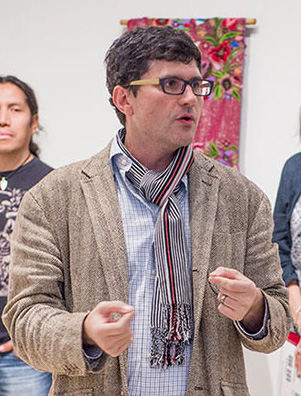
Paul M. Worley is Associate Professor of Global Literature at Western Carolina University. He is the author of Telling and Being Told: Storytelling and Cultural Control in Contemporary Yucatec Maya Literatures (2013; oral performances recorded as part of this book project are available at tsikbalichmaya.org), and with Rita M Palacios is co-author of Unwriting Maya Literature: Ts’íib as Recorded Knowledge (2019). He is a Fulbright Scholar, and 2018 winner of the Sturgis Leavitt Award from the Southeastern Council on Latin American Studies. In addition to his academic work, he has translated selected works by Indigenous authors such as Hubert Malina, Adriana López, and Ruperta Bautista, serves as editor-at-large for México for the journal of world literature in English translation, Asymptote, and as poetry editor for the North Dakota Quarterly.

Juan G. Sánchez Martínez, grew up in Bakatá, Colombian Andes. He dedicates both his creative and scholarly writing to Indigenous cultural expressions from Abiayala (the Americas.) His book of poetry, Altamar, was awarded in 2016 with the National Prize Universidad de Antioquia, Colombia. He collaborates and translates for Siwar Mayu, A River of Hummingbirds. Recent works: Muyurina y el presente profundo (Pakarina/Hawansuyo, 2019); and Cinema, Literature and Art Against Extractivism in Latin America. Dialogo 22.1 (DePaul University, 2019.) He is currently Assistant Professor of Languages and Literatures at UNC Asheville.
Xti Saquirisan Na Pe / Planicie de olvido © Miguel Ángel Oxlaj Cúmez
Translations from Spanish © Paul Worley and Juan G. Sánchez M. ~ Siwar Mayu ~ May 2021

